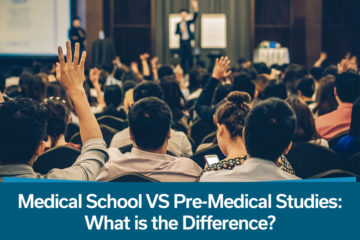
Medical School VS Pre-Medical Studies: What is the Difference?
In this article, I offer an authentic but frank opinion highlighting the contrasts in pre-medical and medical studies, after gone through four years of medical school at UBC.
- It is harder to seek in-person support for academic help or tutoring
We receive lectures from a diverse group of physicians, allied healthcare workers, basic scientists, and patients or patient advocates each week. However, from my experience, outside of the brief intermissions between lectures it is challenging to contact and schedule in-person sessions with lecturers to ask questions. This is understandable given the majority of lecturers are practicing physicians who live busy and hence time-constrained lives. In contrast to an undergraduate BSc where one can drop-in to office-hours, contact with physicians is often limited to E-mail. To further complicate matters, there is a shortage of tutors in clinical medicine as those qualified are limited to healthcare professionals and upper year students with time-constrained schedules of their own. Another option is to ask for clarification within peer-groups, which is common among my class, but often answers are based on speculation and have their uncertainties; furthermore, the quality of responses inevitably differs based on who ones asks and has in their social circle. This all amalgamates into somewhat of an inequity: those at arms-reach from a physician, upper year student, or a knowledgeable social circle are at an advantage compared to those who are not. For the majority of students, this creates the need to become proficient at using external resources to supplement course lectures. Popular resources are Toronto Notes(3) and USMLE First Aid(4), which are condensed UBC-unaffiliated study guides with pertinent clinical information; Osmosis(5) is another platform that hosts condensed yet informed medical videos popular amongst medical students nation-wide. Now this is not to say that human help is impossible to obtain in medical school; however, it is more practical to find external written resources, and time is required for the trial and error necessary to adjust to the resources most intuitive for each individual.
- There will be a “fire-hydrant” of content
I found that the total time spent in class in medicine was more than that of my pre-medical degree. Furthermore, unlike in undergraduate studies where students select their own schedules, classes at UBC medicine are pre-scheduled with consecutive classes and only short 5-10 minute intermissions between, making it challenging to focus and absorb presented information. I also found the basic science in medicine to be taught at a faster pace, albeit with lesser detail and greater volume. Given this diversity and volume of content, known colloquially as the “fire-hydrant” of information, certain strategies have become commonplace amongst my peers to extract the most relevant details—that is, to focus on what is clinically applicable: medications, imaging & blood tests, and symptoms & signs are known informally as “high-yield” information. Now, my goal is not to undermine the importance of other content, but in reality there are limitless potential rabbit-holes in pre-clinical studies. Thus, students must filter information and focus on what is relevant to their specific areas of interest as understanding and memorizing everything presented is not possible (for most).
- You will be evaluated subjectively and you should get used to it
In undergraduate science, objective measures of assessment are hailed as trustworthy and fair: blinding of markers to test papers/assignments are commonly implemented to ensure that each students’ grade is created as unbiased as possible. Although at UBC medicine our written exams are indeed objective, our Work-Based Assessments (WBA) are subjective by their very nature. WBAs are used to evaluate students in clinical skill sessions, family practice visits, and Case-Based Learning (CBL). A preceptor evaluates students regarding areas such as knowledge, professionalism, teamwork, and communication, based on what they see in particular session(s). Though preceptors have guidelines to follow for assessment, there is a large subjective component. As an illustration, CBL is an environment where students are sorted into small groups and collectively analyze a written clinical case. As new findings are presented, the case posits questions which allow students to demonstrate knowledge and soft skills. However, the distinction compared to undergraduate science is that no one asks any particular individual to display their knowledge; it is completely at the students’ discretions to contribute information. To succeed one must not only prepare for the content of CBL, but also develop awareness to social cues, knowing when it is acceptable to speak, ask questions, and build off others’ statements. Ideally, the preceptor’s primary role is to evaluate students and provide performance feedback. Guidance and teaching is minimized, and if one does not speak, it is assumed one does not know. Factors such as the leniency or difficulty of the preceptor in grading, and how prepared and knowledgeable other group members are for CBL may all subjectively influence an individual’s WBA. There is a similarly large subjective component to clinical skills and family practice visit WBAs. Coming from a BSc, this subjective evaluation was novel for me in the transition to medical school, but I realize that it is an integral and invaluable part of medical education as medicine is a subjective field. Patient’s conceptions about their healthcare provider is innately subjective, having great influence on the patient-physician relationship and perceived care. In order to work in a team-based environment, communication, collaboration, and teamwork skills are vital, which are evaluated and responded to subjectively by colleagues. My advice is to familiarize oneself with subjective evaluation by asking questions and practicing speaking out-loud in front of one’s group early-on.
It is my hope that this article offers a more realistic perspective on the transition to medical school to matriculating 1st year medical students from pre-medical undergraduate studies. Indeed, acceptance into medicine and the months thereafter deserves celebration as it is often the culmination of countless years of perseverance; however we must not forget about the stark contrasts between pre-medical and pre-clinical education, catching many off-guard each year.





